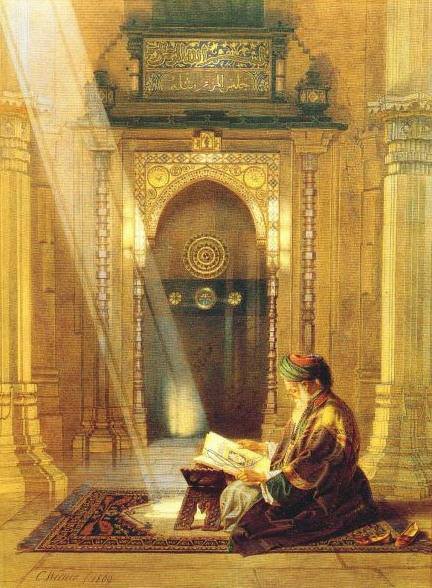ISLAMIC PHIL THEO [ALT]
Mulla Sadra on Intelligibles & Sensibles:
In Mulla Sadra’s philosophy the world of spirits (alam-e-arwah) or the intelligibilia consist of intelligibles (ma’qulat) which are disembodied (mujarrid) forms or substances, this means that they are free from matter (madda) and hence are immaterial.
These disembodied forms or substances are objective existents possessing substantive and concrete reality.
The intelligibles are disembodied which means that they do not possess a corporeal existence.
The existential state of the intelligibles is much more intense and stronger than the existential state of material existents of the sensible world (alam-e-maddi).
In other words it could be said that the intelligibles have a more real existence as compared to the existents subsisting in the world of matter i.e. the senibilia.
It could be deduced from the above that the stronger the association of a being or a thing with matter the weaker and less intense is its existence (wujud) and the more disembodied it is the more intensified is its existence.
The stronger the material association the less real the existence and the weaker the material association the more real the existence.
The material objects and existents subsisting in the sensible world are imperfect and incomplete copies or reflections of the intelligibles found in the spiritual realm.
The intelligible forms (ma’qulat) subsisting in the intelligibilia are the true essences of material existents subsisting in the sensible world of matter, but are more perfect and complete than the particular material existents.
Their perfection is due to their immateriality and immutability.
The intelligibles (ma’qulat) are immutable and therefore possess an unchanging and permanent nature.
On the contrary material existents are subject to change and lack permanence.
Mulla Sadra states that sense perception (idrak-e-hissi) of material existents only tells us about their existence (wujud) but fails to disclose their true reality or quiddity (mahiya).
The quiddity or reality (haqiqa) of material objects or things tells us what that thing is and is therefore its meaning or definition.
This reality or quiddity is equivalent to the disembodied forms or essences called intelligibles (ma’qulat) subsisting in the intelligibilia.
Knowledge (ilm) is acquired by appropriating or grasping these intelligible forms or essences that subsist in the spiritual world of the intelligibilia. This knowledge is more credible and perfect due to the immutable and unchangeable character of the intelligible essences or forms.
[X] . Islamic Philosophy and Theology . (X)

No comments:
Post a Comment